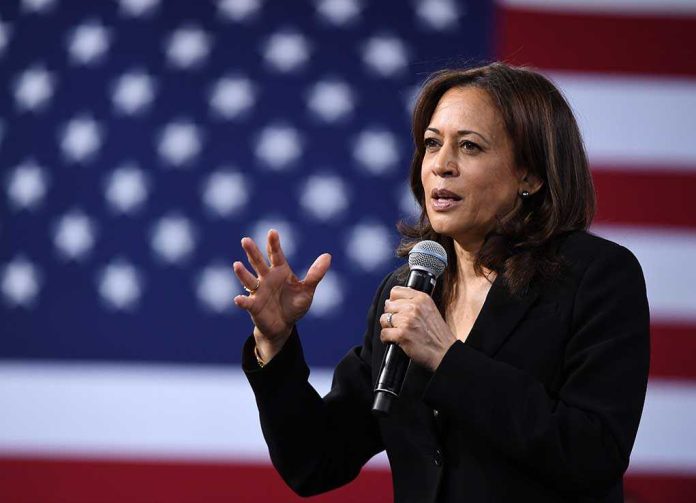
Former Vice President Kamala Harris is desperately attempting to rally opposition against President Trump’s mega bill, even as the legislation gains momentum with Senate approval and heads to the House.
Key Takeaways
- Harris claims Trump’s “One Big Beautiful Bill Act” would strip 17 million Americans of healthcare and increase energy costs by $400 annually for families
- The former Vice President accused Republicans of harming working Americans to fund “$1 trillion in tax cuts for billionaires”
- The legislation passed the Senate with Vice President JD Vance casting the tie-breaking vote
- Republicans are pushing to have the bill signed into law by Independence Day (July 4th)
- Harris is urging citizens to contact their representatives to block the bill in the House
Harris Launches Opposition Campaign Against Trump’s Megabill
As President Trump’s comprehensive economic legislation gains traction in Congress, former Vice President Kamala Harris has emerged as one of its most vocal critics. Following the Senate’s passage of the “One Big Beautiful Bill Act” with Vice President JD Vance casting the decisive tie-breaking vote, Harris has launched what appears to be a last-ditch effort to derail the legislation before it reaches the President’s desk. The bill, which represents a cornerstone of Trump’s second-term economic agenda, is now advancing to the House where Republicans are confident it will pass.
Harris’s criticism centers on claims that the legislation would have devastating effects on everyday Americans, particularly those dependent on government programs. According to Harris, the bill would result in 17 million people losing their healthcare coverage, force rural hospitals to close, and eliminate food assistance for approximately 3 million Americans, including veterans and seniors. These allegations come as Republicans maintain the legislation will stimulate economic growth and reduce government waste.
Economic Impact Claims and Class Warfare Rhetoric
In her statements opposing the bill, Harris employed familiar class warfare rhetoric by accusing Senate Republicans of harming working-class Americans to fund what she characterized as “$1 trillion in tax cuts for billionaires.” She also warned that American families would see their energy bills increase by approximately $400 annually if the legislation becomes law. These claims echo traditional Democrat talking points about Republican economic policies, despite Trump’s consistent messaging about strengthening the middle class.
The former Vice President’s opposition comes at a time when Republicans are working to fulfill campaign promises to streamline government, reduce regulations, and implement pro-growth policies. President Trump has championed the megabill as a comprehensive approach to addressing multiple economic challenges simultaneously, rather than the piecemeal legislative strategy that has often resulted in gridlock in the past. The “One Big Beautiful Bill Act” represents a bold strategy to implement multiple Republican priorities at once.
Race Against Time as July 4th Deadline Approaches
With Republicans aiming to have the bill signed into law by July 4th, Harris is encouraging citizens to pressure their representatives to vote against the legislation in the House. “This fight is not over,” Harris stated in her appeal to Democrat supporters and activists. Her call for grassroots opposition represents an acknowledgment that legislative options for Democrats are limited following their losses in the 2024 election, which gave Republicans control of both chambers of Congress alongside the White House.
Republican lawmakers have dismissed Harris’s criticisms as partisan fear-mongering designed to preserve bloated government programs rather than addressing legitimate concerns about the legislation. They point to provisions in the bill that they argue would strengthen the economy, secure the border, and implement reforms to make the government more efficient and accountable to taxpayers. The push to pass the legislation by Independence Day has symbolic significance for Republicans, who view it as delivering independence from excessive government intervention in the economy.
As the bill moves to the House, the coming days will determine whether Harris’s last-minute opposition campaign gains traction or if President Trump will achieve another significant legislative victory in the early months of his second term. With Republicans holding a majority in the House, the odds currently favor passage, despite Democrat opposition.














